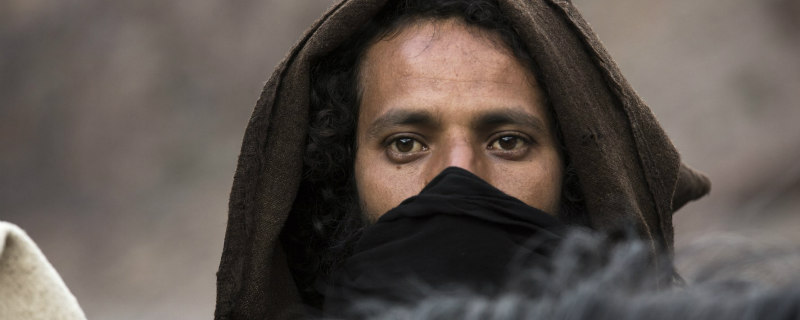
Review by Benjamin Poole
Directed by: Oliver Laxe
Starring: Ahmed Hammoud, Shakib Ben Omar, Said Aagli, Ikram Anzouli

There is an elemental quality to the photography of Santiago Fillol and Oliver Laxe’s (writer, director) Mimosas that permeates the soul, soaking the viewer in its palette of deep apricot sands and frozen whites in a manner similar to how the film’s world weathered protagonists are in turn overwhelmed by the beautiful and treacherous Moroccan environments which they traverse. Veteran cinematographer Mauro Herce’s camera makes an inspiring character of the Moroccan Atlas, which is depicted with imposing veracity. We experience the existential openness of the burnished plains, and the screen also somehow grips jutting rocks in the snow, allowing us to watch characters trudge ice from seemingly impossible angles. The score is minimal, as is the dialogue: Laxe simply cuts from the toughened faces of his cast to the panoramas of the Atlas, explicating the relationship between man and nature, and creating a visual rhythm which is as hypnotic and as cadenced as praying.


Mimosas’ publicity bills it as a ‘religious Western’, and its plot correspondingly focusses upon a caravan which is escorting a dying Sheikh across the mountainous terrain. The Sheikh’s dying request is to be buried with his family, who are inhumed in a village on the other side of the Atlas. However, the troop, fearing (quite rightly) the bandits that prowl the mountains, along with the dangerous topography, get the willies. So, it falls to a couple of ‘rogues’ (along with a few of the caravan’s hardier members), Shakib (Shakib Ben Omar) and Ahmed (Ahmed Hammoud), to fulfil the Sheikh’s destiny.
The spiritual overtones of the plot explicate the religiosity of Mimosas; in one moving example of the film’s respectfully detailed portrayal of tradition and devout custom, we see an elder pack the corpse with ice. Yet, generically too, all Westerns are perhaps religious in that, at their most ideological, they are paeans to a manhood held as divine and ruggedly pure; and so Mimosas also becomes a universal examination of masculinity, the pressed limits of male strength and the importance of honour.

Although Mimosas is largely a sombre affair (and as slow moving as, well, a caravan trekking across the mountains), there is light and shade. Shakib and Ahmed are a couple of chancers whose promises far exceed their abilities, giving way to weird comic beats that my dark sense of humour found delightful. Midway through the film, the camp fall asleep and wake up to find that the donkey, with the corpse strapped to it, has only gone and wandered off somewhere in the night, meaning that the gang have to search the scrub for it (‘It can’t have gone far…’). Later, they are attacked by waterside bandits and lose the body again, watching as it floats away down the river (!), like something out of a Western Kingdom Weekend at Bernies.

However, the potential horror of the situation is never in doubt: the bandits are a bunch of snaggle toothed rotters, who are merciless in their killing and torture of those they capture. It is this sort of malevolence which galvanises our two rogues to do, in the generic idiom, what a devout’s gotta do: we first meet Shakib inaccurately proselytising about Imlis/Iblis, initially, he is all talk. The town where Shakib and Ahmed come from is a sharp contrast to the decorously framed wilderness, a world of grease, brick and dust, where men vie hopelessly for work. It is in the Holy land of the Atlas where the hapless pair find true drive and redemption, and where Mimosas also soars, leading us into a world of sacred, dangerous landscapes and divine purpose.

Mimosas is in UK cinemas August 25th.

